Episodes
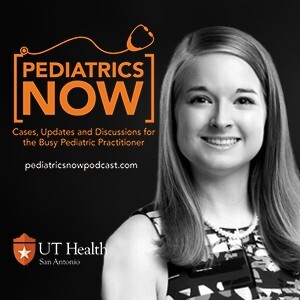
Friday May 30, 2025
Friday May 30, 2025
Link for CME Credit coming soon!
Join host Holly Wayment for a grand rounds talk from Dr. Kang, a pediatrician and neonatal perinatal medicine fellow, as she delves into the world of alternative birth practices. This episode covers a range of topics including water immersion for labor, vaginal seeding, and umbilical non-severance, illustrating the growing interest in these methods. Dr. Kang provides an overview of the benefits and risks associated with each practice, offering insights into their prevalence and the existing medical recommendations.
Understand the reasons behind the increasing popularity of these practices and their implications. This episode provides a valuable perspective on contemporary birthing trends and highlights the importance of well-informed guidance for families exploring these options.
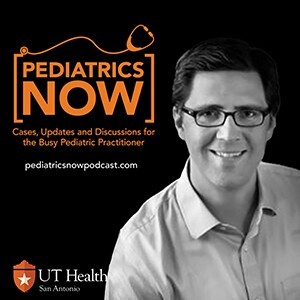
Friday May 23, 2025
Friday May 23, 2025
Link for CME Credit:
https://uthscsa.edu/medicine/education/cme/pediatrics-now-podcastIn this episode of Pediatrics Now, Dr. David Roberts, an Associate Professor of Psychiatry at UT Health San Antonio, returns to discuss with host Holly Wayment the impactful communication technique known as motivational interviewing. With a particular focus on engaging pediatricians and families, Dr. Roberts illustrates how this approach can facilitate open, trusting dialogues around challenging topics like vaccination and behavioral issues in children. He shares practical insights on fostering autonomy and understanding ambivalence in both parents and younger patients, ultimately aiming to support healthier choices through empathetic and skillful conversation. Join us to explore how motivational interviewing can transform interactions in pediatric practice.
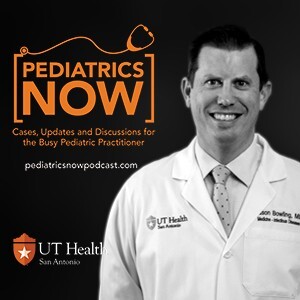
Friday May 16, 2025
Friday May 16, 2025
link for free CME credit coming soonJoin host Holly Wayment as she delves into the pressing issue of measles in Texas with Dr. Jason Bowling, a leading expert in infectious diseases. Dr. Bowling discusses where we are right now with measles, a disease that was previously declared eradicated due to vaccination, the impact on the community, and the critical role of vaccination in preventing further spread.
Learn measles symptoms can mimic other viral infections, and the steps pediatricians can take to accurately diagnose and manage suspected cases. Dr. Bowling also shares insights on the importance of maintaining high vaccination rates to create a "firewall", highlighting the challenges of vaccination hesitancy and the measures needed to counter it.
This episode is an essential listen for busy pediatric practitioners in Texas, around the globe, and elsewhere in the US as they navigate the complexities of a measles resurgence. This episode includes advice about measles testing and isolation protocol.

Thursday May 08, 2025
Thursday May 08, 2025
https://cmetracker.net/UTHSCSA/Publisher?page=pubOpen#/getCertificate/10098690
In this episode, host and executive producer Holly Wayment dives into motivational interviewing (MI) with expert David Roberts, Ph.D.. Discover how this gold-standard counseling approach can dramatically improve treatment adherence for pediatric practitioners. Dr. Roberts, a seasoned psychiatrist and member of the Motivational Interviewing Network of Trainers, shares his extensive experience in training over 3,000 healthcare professionals in MI. Roberts has a new, more flexible way for busy practitioners to learn MI.
www.reflectivetraining.org
Learn how to implement motivational interviewing in busy practice settings. With insights from real-world cases, this episode is a must-listen for practitioners eager to enhance patient engagement and foster behavioral change.
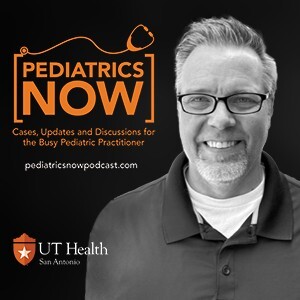
Wednesday Apr 30, 2025
Wednesday Apr 30, 2025
Link for Free CME Credit:
https://cmetracker.net/UTHSCSA/Publisher?page=pubOpen#/getCertificate/10098672
In this episode of Pediatrics Now, host Holly Wayment engages in a conversation with Matthew Anderson, Vice President of Customer Service at PayPal and Venmo. Together, they explore the transformative lessons that pediatric practitioners can learn from customer service practices in the corporate world. Discover how fostering professionalism and empathy among medical teams enhances patient relationships, and learn practical strategies for addressing sensitive topics such as financial discussions with grace. Anderson shares valuable insights on improving customer service in pediatrics, underscoring the power of incremental changes, relationship building, and transparent communication. Tune in for a thought-provoking discussion on creating a more patient-centered and harmonious pediatric practice.

Thursday Apr 24, 2025
Thursday Apr 24, 2025
Link for CME Credit
https://cmetracker.net/UTHSCSA/Publisher?page=pubOpen#/getCertificate/10098640
Join host Holly Wayment on Pediatrics Now as she explores the intersection of medicine and customer service with Matthew Anderson, Vice President of Customer Service for PayPal and Venmo. Discover how principles from the corporate world can enhance patient care and communication in pediatric settings. Learn the significance of humanizing interactions and the critical components that can transform transactional activities into meaningful relationships. Matthew shares personal experiences and practical advice that empower practitioners and their medical teams. Tune in and gain insights to revolutionize patient engagement and satisfaction.
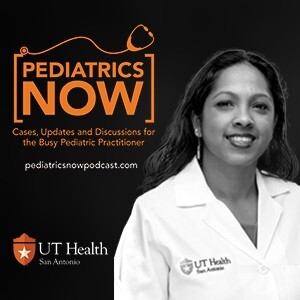
Friday Apr 18, 2025
Friday Apr 18, 2025
Link for MOC Credit
https://cmetracker.net/UTHSCSA/Publisher?page=pubOpen#/getCertificate/10098633
Host and Executive Producer Holly Wayment brings us this insightful child abuse talk by Dr. Natalie Kissoon, as she shares crucial insights into recognizing child abuse in pediatric care. This episode dives deep into case-based discussions, focusing on common signs of abuse such as unexplained bruises, sentinel injuries, and abusive head trauma. Dr. Kissoon emphasizes the importance of a thorough medical evaluation and offers practical guidance for identifying hidden patterns of maltreatment.
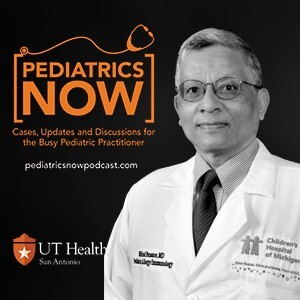
Wednesday Apr 16, 2025
Wednesday Apr 16, 2025
Link for MOC Credit!
https://cmetracker.net/UTHSCSA/Publisher?page=pubOpen#/getCertificate/10098629
Join Host and Executive Producer Holly Wayment for this grand rounds episode for MOC credit. We bring you a talk by Dr. Millind Pansare on FPIES, highlighting the crucial role of clinical awareness and research in combating this condition. Discover the clinical presentation, risk factors, and the significance of educational support for caregivers navigating this challenging syndrome. Join us for an informative session that seeks to empower medical professionals with knowledge about this critical pediatric health topic.
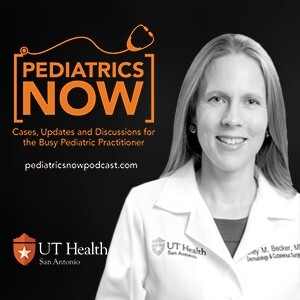
Monday Apr 14, 2025
Monday Apr 14, 2025
Link for CME Credit Coming Soon!
Welcome to this episode of Pediatrics Now with Holly Wayment, brought to you by the Department of Pediatrics,0 as she discusses acne myths and truths with Dr. Emily Becker, the head of Pediatric Dermatology at University Health and UT Health San Antonio. Together, they delve into common misconceptions about dietary causes of acne, the importance of appropriate skincare, and effective treatment options available for adolescents.
Dr. Becker shares insights from her extensive training and experience in dermatology, discussing how different types of milk can affect acne and offering practical advice on acne management, particularly for pediatricians handling cases without immediate access to dermatologists. Discover the journey of Dr. Becker from Texas to New York and back, her dedication to pediatric dermatology, and a sneak peek into her life outside medicine.
Stay tuned for details on the latest dermatological treatments for conditions like eczema, alopecia areata, and some advice on avoiding harmful social media skincare trends.
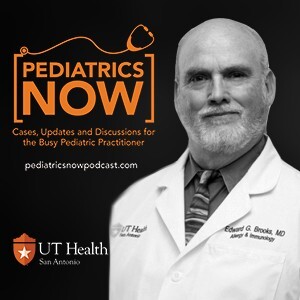
Friday Apr 04, 2025
Friday Apr 04, 2025
Link for CME Credit:
https://cmetracker.net/UTHSCSA/Publisher?page=pubOpen#/getCertificate/10098535
Join Holly Wayment on Pediatrics Now as she welcomes back Dr. Ed Brooks. In this episode, they dive into the best practices for managing tree pollen allergies, discussing the effectiveness of nasal steroids over antihistamines.
Dr. Brooks also sheds light on the phenomenon of periodic fevers in children, explaining the auto-inflammatory conditions associated with such fevers and how to distinguish them from other illnesses. Explore various treatment options and the role of genetics in diseases like PFAPA and Mediterranean fever.
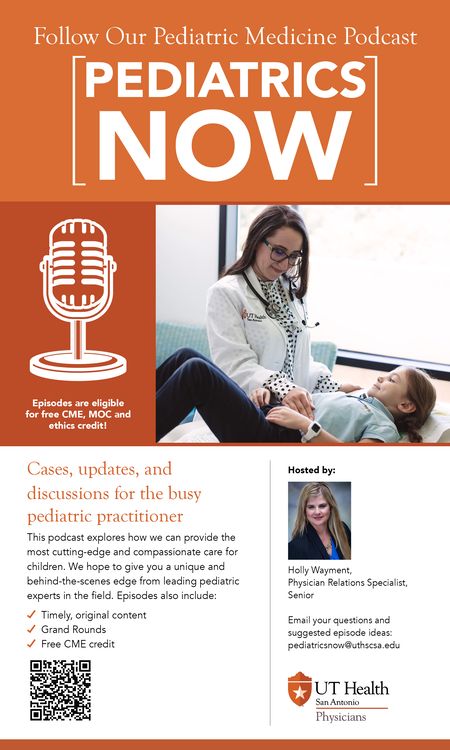
Host and Author Holly Wayment talks to experts about timely topics for pediatric practitioners for free credit that can include CME, MOC and ethics credit. Topics include compassion, up-to-date treatments, how to connect with patients and how to fight burnout plus have more empathy.









